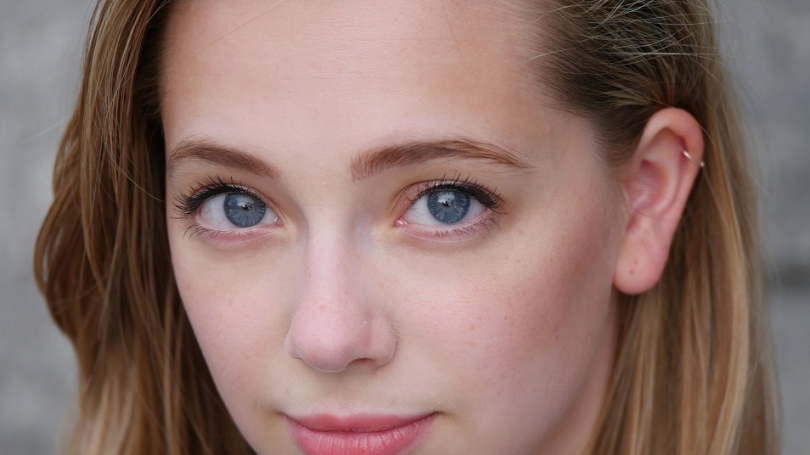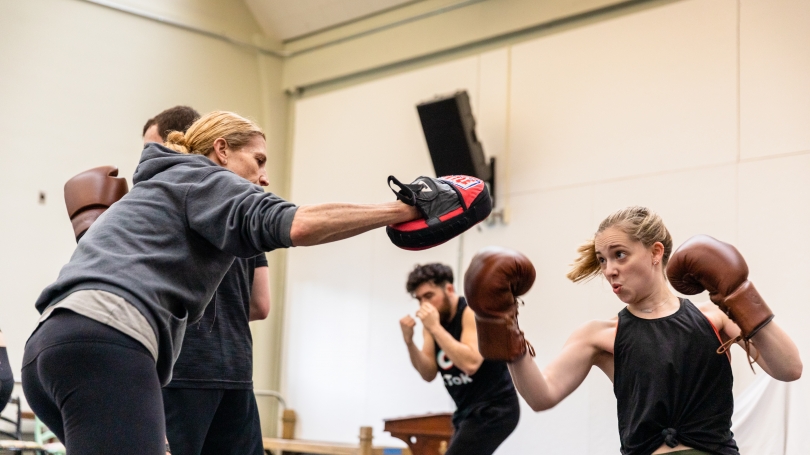"Bruising" Women: Kerrigan Quenemoen '20
In anticipation of The Sweet Science of Bruising's US premier, we spoke with the actors who portray female boxers in Victorian England. This is the fourth of four interviews.
Starting February 21, The Sweet Science of Bruising will be making its US premiere at the Hopkins Center. By British theater and TV writer Joy Wilkinson, the play follows the stories of four Victorian-era women, and how their lives become intertwined within the underground boxing scene. Each with her own motivations and backstory, the unlikely group of women find themselves inextricably linked to each other through their struggle to navigate a male-dominated sport at a time when women were granted few freedoms and rights. Who are these women, and how did they find themselves in the boxing ring? Today we meet Violet Hunter, played by Kerrigan Quenemoen '20.
How would you describe your character, Violet Hunter?
Violet is in her early 20's and she comes from a wealthy family. She is a nurse at the beginning of play, and she really wants to be a doctor, but that wasn't really a possibility at the time. However, Violet hears of a woman, Elizabeth Garrett Anderson, the first woman who is studying to become a doctor in Paris, and she decides that she wants to do that as well.
Violet is very smart and intuitive, and she practices stitching and performing operations on cadavers in secrecy, because women weren't allowed to in public. She works with Dr. Bell, a doctor who she forms a good working relationship with, and he allows her to have a little bit more agency within his office so she is able to perform minor procedures. She is also very active in the women's suffrage movement.
How does Violet become involved in the boxing world?
Violet is first introduced to boxing because she gets hired to be the doctor for Polly's first match against her brother. So, as Violet watches it, she gets very excited by the idea of women getting on their feet and showing what they are capable of. She gets caught up in that idea and becomes very active in the boxing scene. For a while, she's the champion and title holder. But at the same time, she's mostly doing it so that she can win money to pay to study in Paris.
Do you think that the play tells an empowering story for women?
Yes. I saw the play this summer in London on the FSP and a large takeaway was that the play focuses on women specifically through their relationships with men. Going into it, I think we all expected to focus on the four women individually and their relationships with each other. I don't think that one way or the other is necessarily the "right way" but it's interesting to define womanhood and empowering women through their relationships with men. That aspect in itself is complicated, and might lead the play to resonate a little bit less so with being an empowering story. But it's really important to learn why these women are doing what they are doing. Joy Wilkinson decided to focus on their incentives for boxing and why it is an empowering mode of expression for them. And I think that's something that the audience can relate to -- finding that thing that lets you get out of your head and escape from whatever is going on in your life. That is the universality of it.
How have you prepared to play the role of Violet?
Oftentime when I think about characters, I try to identify what part of the body is driving them. Violet is a very brain-oriented person. She's very smart and well studied and likes to think. But at the same time, she's very passionate. And her brain side, or rational side, can be juxtaposed by her occasional irrationality. There's one fencing scene, where she's sparring with her aunt, and it's a very casual scene -- they're not trying to hurt each other -- but Violet gets very heated in their discussion about womanhood and women's suffrage and she almost hurts her aunt. So I try to reconcile where the line is between her rational and irrational side. I think all humans have a little bit of both, but you often find people who lean toward one side more than the other. But Violet is pretty balanced between the two. So it's interesting to see when she chooses her brain or her heart.
Are there parts of Violet that you identify with?
Violet really stops at nothing to follow her dream of becoming a doctor. And I personally find that to be something I connect with. I am trying to go into an acting career and I'm a graduating senior. And although it's not as taboo as a woman becoming a doctor in the 19th century, it's still a pretty difficult career to navigate. So I think I am particularly inspired by her ability to think out of the box and figure out how shes going to achieve her goals. She had never even heard of boxing before everything started happening and then she became the champion. So it's cool to think about how we can all take different paths to pursue our dreams. And that path doesn't always have to make the most sense or be the most obvious from the beginning.
How did you get into acting at Dartmouth?
I did a lot of theater in high school but was pretty jaded by it by the end. I had a bad high school director who sort of made me lose my love for it. So when I came to Dartmouth, I knew I wanted to do theater extracurricularly, but I thought I was going to major in art history or government, or something along those lines. And then I auditioned for a show my freshman fall and got in. It was a five-person cast with a student director and they immediately became my people on campus, and the place where I felt the most comfortable. My transition to Dartmouth was hard, as it is for most people, but having the consistency of theater helped me get my feet on the ground. And once I continued doing shows, I couldn't really stop. I've done a show every single term I've been here, and honestly, I can't imagine my life on campus without it.
What has the dynamic of the cast been like?
I think that amongst the four women, the bonding became necessary pretty quickly when we started taking boxing classes. During the first two weeks of rehearsals, we had a boxing instructor from the River Valley Club come in around three to four times a week to teach us how to box. It was exhausting, but I think that having such an intimate class helped us form close relationships.
I knew Brooke going into the show, but I didn't know Jacqui or Veronica, and it's been really great having them in the production. In some of the past shows I've been in, all of the leads were seniors, so we weren't really making new friendships. But we all got dinner the other day, and Jacqui and Veronica were asking me and Brooke for advice on the theater major and the FSP, and it kind of felt like we were passing down the torch. There is a corset in the costume department that I've worn for several shows over the years, and Veronica is wearing it for this production. So it's kind of like I got to bequest it to her.
When you saw the original show in London, what was your immediate impression of the production? How has that influenced your acting decisions?
It was funny because by the intermission, I immediately knew that I wanted to play Violet. And everyone I was telling that to started laughing because they were saying, "well that's because it's literally you on the stage right now," since I have a similar look and energy to the actress playing Violet. So, because I knew that it was a role I wanted to play, I paid close attention to the actress' performance. But I do think that it's good that I don't remember it so vividly, because otherwise, I would be trying to replicate how the actress had portrayed her. It's far enough in my head that while I remember some of her movements, and the way she carried herself, I don't particularly remember specific choices she made. So her performance helped guide me initially, but beyond that, I can make my own acting decisions.
Why do you think everyone should go see the play?
This show is going to be a crazy experience that you won't find very often in theater. It's almost circus-y in how all of the acts are happening -- there's fencing and boxing and singing and dancing. And then there's a burlesque show in the middle of it. It combines so many facets of entertainment and forms of theater into this exploration of the four women. But at the same time, it's not just a spectacle -- it has a lot of depth and deals with very serious issues. The show is a once-in-a-lifetime experience.

